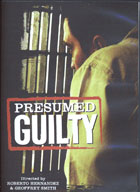
Presumed Guilty 2009
Distributed by Icarus Films, 32 Court St., 21st Floor, Brooklyn, NY 11201; 800-876-1710
Produced by Layda Negrete, Roberto Hernández, Martha Sosa, Yissel Ibarra
Directed by Roberto Hernández, Geoffrey Smith
DVD, color, 88 min.
Sr. High - Adult
Criminal Justice, Prisoners and Prisons, Human Rights, Area Studies, Latin American Studies
Date Entered: 02/11/2011
Reviewed by Gisele Tanasse, University of California BerkeleyPresumed Guilty,, the riveting story of the hard-won retrial of a Mexican prisoner, Toño Zúñiga, serves as an indictment of the entire Mexican criminal justice system. The conditions in the prison, though dreadful, are not surprising in a system where one is presumed guilty until proven innocent and 92% of convictions are not based on any kind of physical evidence. Prisoners are packed into tiny cells, some are forced to sleep on the concrete floor in the small space below the bottom of lowest bunks, aptly named, “the tomb,” where they are often prey to the nighttime scurrying of rats and cockroaches.
These conditions pale, however, in comparison to the ridiculous and horrifying spectacle of the retrial of Zúñiga, a street vendor, convicted of murder based on the questionable testimony of a sole witness. The real life “courtroom” drama plays out in what appears to be an informal gathering around the judge’s small desk. The prosecutor and defense attorneys flank each witness, facing the judge, while the prisoner looks on from behind, in a small dingy cell. Confusion and chaos often result from a seeming lack of process and formality. In this particular case, the smug police officers clearly resent having to testify. The prosecutor, unprepared and generally unprofessional, seems to frequently take the defense’s arguments as personal attacks and curtly promises to deliver her statements later, on a floppy disc.
One of the most fascinating components of the ordeal was the much anticipated “face-off,” when the accused has face to face conversations with his accusers, through a barred window. It is a bizarre semblance of having one’s day in court that should seem pointlessly redundant: what could the prisoner possibly argue more effectively than his attorneys? Because the defense is so frequently silenced by the unruly protests of the prosecutor, witnesses and even the judge, the face-off strangely appears to allow for a more even playing field. It still borders uncomfortably on a he said she said style debate, where the person behind bars is at a necessary disadvantage by virtue of the presumption of guilt.
While the retrial shockingly results in another guilty verdict (copied word for word from the original guilty verdict), Zúñiga ultimately wins on appeal. It is only the video of the retrial, provided by the filmmakers, that successfully convinced one appellate judge that there was room for reasonable doubt. That judge then argued his case to his peers for over 8 hours.
Overall, the film would likely best be suited for courses in international and area studies, especially those with a focus on human rights and prisoners’ rights. It would also seem to serve as an excellent contrast in ethics courses in criminal justice programs and for law school students. Though not indicated on the commercial packaging, the documentary was originally released in Mexico, under the title Presunto culpable. The Icarus Films release is in Spanish with English subtitles.